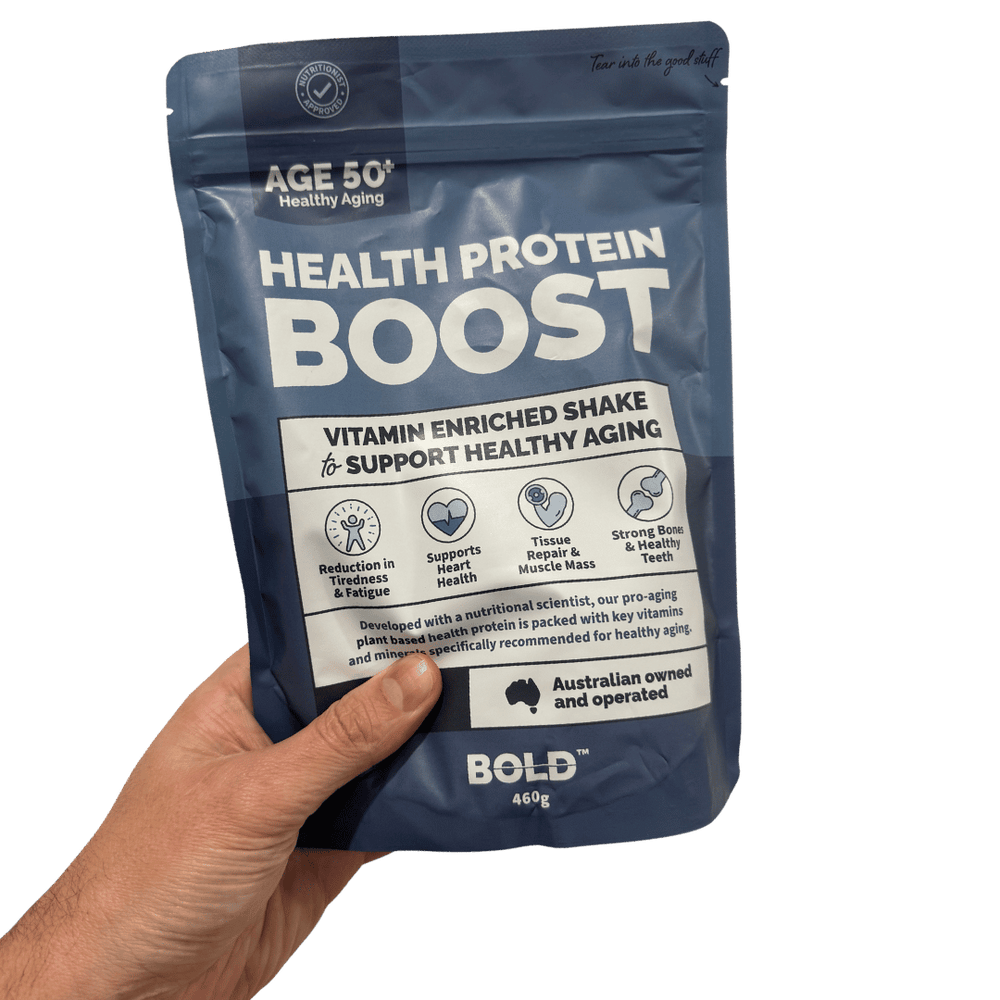What Are GLP-1 Agonists? How Do They Work for Weight Loss and Diabetes + Nutrition Tips to feel your best
GLP-1 agonists like Ozempic and Wegovy have become increasingly used for managing type 2 diabetes and supporting weight loss. But how do they actually work, and what should you know if you're using them?
No time? Here are 3 key takeaways from the article:
- GLP-1 agonists like Ozempic and Wegovy help manage type 2 diabetes and support weight loss by increasing insulin production, slowing digestion, and reducing appetite.
- Proper nutrition remains critical while using GLP-1 medications, especially ensuring sufficient protein intake to prevent muscle loss, fatigue and nutrient deficiencies.
- Bold BOOST is ideal for people using GLP-1 agonists, offering high-quality, gut-friendly, low calorie protein plus essential nutrients to help maintain muscle mass, energy, and overall health during weight loss.
Here’s a clear, straightforward guide on GLP-1 Agonists, what they do, how they work and how to feel your best while taking them 😊

💊 What Are GLP-1 Agonists?
Let’s start with the basics—GLP-1 agonists are medications that act like a natural hormone in your gut, helping your body manage blood sugar and hunger.
GLP-1 (glucagon-like peptide-1) agonists mimic a hormone that regulates blood sugar, digestion, and appetite. 🧠🍽️
Popular ones include:
- Ozempic / Wegovy (semaglutide)
- Victoza / Saxenda (liraglutide)
- Trulicity (dulaglutide)
Originally made for type 2 diabetes, they’re now prevalent in the weight loss world too.
How Do GLP-1 Agonists Work?
These medications help the body in a few key ways:
- Increase insulin production - Stimulating the pancreas to release insulin when blood sugar levels rise, helping to maintain glucose levels.
- Slow down digestion - Delaying gastric emptying, leading to prolonged feelings of fullness and reduced overall food intake, which helps you feel full longer
- Reduce appetite - Acting on the brain’s appetite control centers, leading to a natural reduction in hunger and cravings.
Together, these effects help lower blood sugar and support weight loss.
What Are the Benefits?
The popularity of GLP-1 agonists is largely due to the wide range of health benefits they offer, including
- Effective blood sugar control – Helping regulate glucose levels and reducing diabetes-related complications.
- Significant weight loss – Many users experience substantial weight loss, making these medications valuable for obesity management.
- Heart health benefits – Studies suggest they may lower the risk of cardiovascular events such as heart attacks and strokes.
- Potential brain benefits – Emerging research indicates neuroprotective properties that may reduce the risk of conditions like Alzheimer’s disease.
Why Nutrition Still Matters
Because GLP-1 agonists reduce appetite and slow digestion, many people eat less while using them. While this supports weight loss, it can also lead to nutrient deficiencies if you're not careful.
To stay healthy, it's important to focus on:
- Protein intake – Helps prevent muscle loss and promotes better healing
- Essential vitamins and minerals – Deficiencies in essential nutrients, especially B vitamins, vitamin D, and electrolytes, can occur. Including nutrient-dense foods or taking supplements can help
- Hydration and fiber – Slower digestion can cause constipation. Drinking plenty of water and consuming fiber-rich foods supports digestive health
Why Protein Is So Important
Some muscle loss is inevitable with weight loss. Since GLP-1 agonists suppress appetite, low protein intake can lead to unintentional muscle loss. Protein intake is essential for maintaining muscle, metabolism, and overall energy levels. Here’s why:
- Reduces/minimises Muscle Loss – These medications significantly reduce hunger, which can lead to lower protein intake. Without enough protein, the body may break down muscle as well as fat.
- Muscle mass helps insulin sensitivity - a larger muscle mass is more effective at regulating glucose homeostasis –
- Boosts Metabolism – Muscle burns more calories than fat, so maintaining lean mass keeps metabolism higher.
- Prevents Fatigue & Weakness – Decreased muscle mass contributes to fatigue, especially during activity.
How Much Protein Do You Need?
For people using GLP-1 medications, experts generally recommend 1.2 to 2.0 grams of protein per kilogram of body weight each day, depending on your activity level.
So if you weigh 65KG, you should be getting between 75grams and 130grams everyday, and it doesn't matter if you are male or female.
And you should try and split that across the day, so 25-40 grams in the morning, midday and afternoon/evening.
A few examples below:
Assuming 3 meals per day. The lower number without exercise and the higher number if you are exercising a lot.
1.2 to 2.0 grams of protein per kilogram of body weight
How Bold Health Protein Plus Can Help
If you're using Ozempic or another GLP-1 medication, Bold Health Protein Plus is a convenient way to support your nutrition and health goals. It's high in protein and has all the recommended vitamins and nutrients you need to maintain good health + it's low in calories and sugar ✅✅✅ All-in-one Goodness!
Some of the key benefits:
- High-Quality Protein – Contains easily digestible plant-based protein to maintain muscle mass without causing digestive discomfort.
- Gut-Friendly Ingredients – Includes prebiotic fiber and digestive enzymes to aid digestion and prevent bloating and nausea.
- Rich in Essential Nutrients – Fortified with vitamins and minerals like Vitamin D, B12, Calcium, Magnesium, and Potassium to counteract deficiencies.
- Supports Heart Health – Low in saturated fat and includes vegan Omega-3 DHA, which has anti-inflammatory properties beneficial for cardiovascular health.
- Convenient and Flexible – Can be mixed with water, added to smoothies, or used in recipes.
- Promotes Healing and Energy – With anti-inflammatory ingredients like turmeric extract, it aids tissue repair and recovery.
Plus it's very low in calories - the perfect partner!
🚀 Final Thoughts
GLP-1 agonists are game-changers for managing diabetes and dropping pounds—but nutrition still matters. Fuel up right and feel your best 💥
And hey, if you’re on Ozempic, Bold Health Protein Plus might just be your secret weapon for staying strong, nourished, and on track 🙌
And remember, If you’re considering these medications, consult a healthcare provider to determine if they’re right for you and how to optimize your diet for the best results.
Looking for more scientific detail? Read on
How Do GLP-1 Receptor Agonists Work?
Glucagon-like peptide-1 (GLP-1) receptor agonists are a class of medications that mimic the action of the endogenous hormone GLP-1, which is released in response to nutrient intake.
These drugs enhance glucose-dependent insulin secretion from pancreatic β-cells, meaning they stimulate insulin release only when blood glucose levels are elevated, thereby reducing the risk of hypoglycemia. They also suppress glucagon secretion, a hormone that raises blood sugar, further contributing to glycemic control.
In addition to their effects on pancreatic function, GLP-1 agonists delay gastric emptying, slowing the rate at which food leaves the stomach. This not only leads to a prolonged sensation of fullness (satiety) but also reduces postprandial glucose spikes. Furthermore, these agents act on the hypothalamus and other brain regions involved in appetite regulation, decreasing hunger and overall caloric intake.
These combined actions help improve glycemic control and promote weight loss, which is particularly beneficial for individuals with type 2 diabetes or obesity.
The Role of Protein Intake
Adequate protein intake is especially important when using GLP-1 receptor agonists, as these medications can lead to significant reductions in appetite and food intake.
Without careful dietary planning, this may result in a calorie deficit that compromises lean body mass. Protein is crucial for preserving muscle mass, supporting metabolic health, and aiding in tissue repair—especially during periods of weight loss.
Additionally, protein has a high thermic effect and promotes satiety, complementing the appetite-suppressing effects of GLP-1 agonists. Ensuring sufficient protein consumption can therefore enhance the efficacy and safety of these medications while supporting long-term health outcomes.



